- Nearly two years after he killed Trayvon Martin, George Zimmerman speaks to CNN
- He says he hopes to become an attorney "to stop the miscarriage of justice"
- With paintings, Zimmerman says he's hoping to "provide a decent lifestyle" for his family
- "I don't watch news anymore," he says when asked about Michael Dunn's case
(CNN) -- George Zimmerman says he still gets death threats, is still accused of being a racist and is still a lightning rod for criticism.
But in the end, there's only one judge who matters, he told CNN.
"God," Zimmerman said in an interview broadcast on CNN's "New Day" on Monday. "I know that ultimately, he's the only judge that I have to answer to.
"He knows what happened. I know what happened. So I'd leave it up to him."
It's been seven months since a Florida jury acquitted Zimmerman of second-degree murder and manslaughter charges in Trayvon Martin's death.
Zimmerman thought his life would go back to normal.
Troubles often follow high-profile acquittals

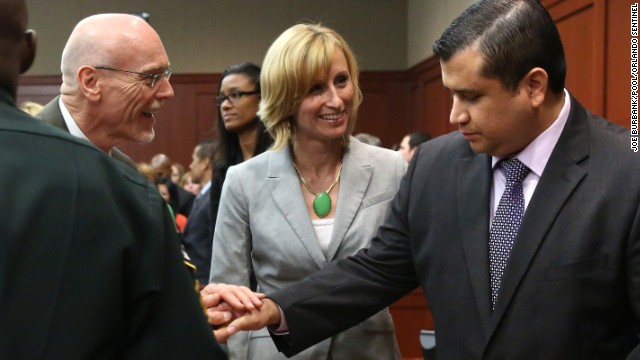 George Zimmerman is congratulated by members of his defense team, Don West and Lorna Truett, after the not guilty verdict is read on Saturday, July 13, in Sanford, Florida. A jury of six women found him not guilty in the shooting death of Trayvon Martin. View photos of the public reaction to the verdict.
George Zimmerman is congratulated by members of his defense team, Don West and Lorna Truett, after the not guilty verdict is read on Saturday, July 13, in Sanford, Florida. A jury of six women found him not guilty in the shooting death of Trayvon Martin. View photos of the public reaction to the verdict.  George Zimmerman's wife, Shellie Zimmerman, cries as friends and family members celebrate the verdict on July 13.
George Zimmerman's wife, Shellie Zimmerman, cries as friends and family members celebrate the verdict on July 13.  Robert Zimmerman Sr. and Gladys Zimmerman embrace after their son is found not guilty on July 13.
Robert Zimmerman Sr. and Gladys Zimmerman embrace after their son is found not guilty on July 13. 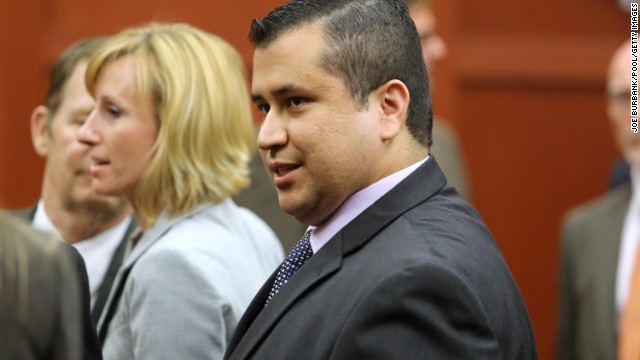 George Zimmerman prepares to leave the courtroom after the not guilty verdict is read on July 13.
George Zimmerman prepares to leave the courtroom after the not guilty verdict is read on July 13.  Zimmerman confers with his defense team on July 13, after working out the wording for a response to the jury, who had asked for clarification on the instructions regarding manslaughter. The response, crafted and agreed to by both the prosecution and defense, instructed the jury to ask their question more specifically, as the court could not engage in general discussion.
Zimmerman confers with his defense team on July 13, after working out the wording for a response to the jury, who had asked for clarification on the instructions regarding manslaughter. The response, crafted and agreed to by both the prosecution and defense, instructed the jury to ask their question more specifically, as the court could not engage in general discussion.  Zimmerman and his defense team stand in the courtroom as the jury arrives before starting their second day of deliberations on July 13.
Zimmerman and his defense team stand in the courtroom as the jury arrives before starting their second day of deliberations on July 13.  Prosecutor John Guy addresses the jury with his closing rebuttal during Zimmerman's murder trial on Friday, July 12. "He shot him because he wanted to," Guy told jurors, saying that Zimmerman didn't have to shoot 17-year-old Martin.
Prosecutor John Guy addresses the jury with his closing rebuttal during Zimmerman's murder trial on Friday, July 12. "He shot him because he wanted to," Guy told jurors, saying that Zimmerman didn't have to shoot 17-year-old Martin.  Zimmerman's attorney Mark O'Mara holds up a chart during closing arguments for the defense on Friday, July 12. "How many 'what ifs' have you heard from the state in this case?" O'Mara asked the jury. "They don't get to ask you that."
Zimmerman's attorney Mark O'Mara holds up a chart during closing arguments for the defense on Friday, July 12. "How many 'what ifs' have you heard from the state in this case?" O'Mara asked the jury. "They don't get to ask you that."  Zimmerman, right, sits with another defense attorney, Don West, this week. West objected to a third-degree murder charge also sought by prosecutors on Thursday, July 11, the day closing arguments began. The judge ruled out that charge but said the jury could consider convicting the defendant of manslaughter.
Zimmerman, right, sits with another defense attorney, Don West, this week. West objected to a third-degree murder charge also sought by prosecutors on Thursday, July 11, the day closing arguments began. The judge ruled out that charge but said the jury could consider convicting the defendant of manslaughter.  Dr. Vincent Di Maio, a forensic pathologist and gunshot wound expert, describes Zimmerman's injuries while testifying for the defense Tuesday, July 9.
Dr. Vincent Di Maio, a forensic pathologist and gunshot wound expert, describes Zimmerman's injuries while testifying for the defense Tuesday, July 9.  Defense attorney Mark O'Mara, right, questions forensics animation expert Daniel Schumaker, center, at the bench of Judge Debra Nelson with Assistant State Attorney Richard Mantei, left, during a July 9 hearing on the admissibility of animation created for the defense. Schumaker showed the judge and Mantei some 3-D animation on his laptop after an overhead projector didn't work.
Defense attorney Mark O'Mara, right, questions forensics animation expert Daniel Schumaker, center, at the bench of Judge Debra Nelson with Assistant State Attorney Richard Mantei, left, during a July 9 hearing on the admissibility of animation created for the defense. Schumaker showed the judge and Mantei some 3-D animation on his laptop after an overhead projector didn't work.  John Donnelly, a friend of George Zimmerman's, cries on the witness stand on Monday, July 8, in Sanford, Florida, after listening to screams on the 911 tape entered in evidence.
John Donnelly, a friend of George Zimmerman's, cries on the witness stand on Monday, July 8, in Sanford, Florida, after listening to screams on the 911 tape entered in evidence. 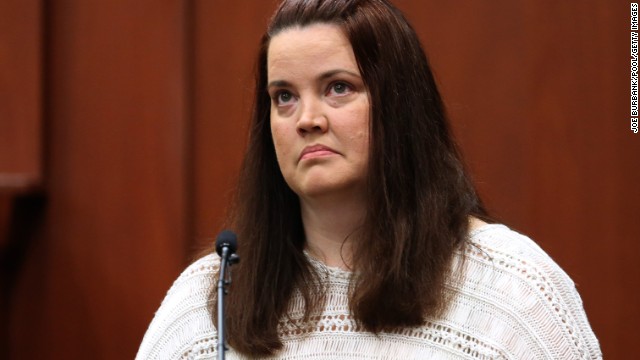 Sondra Osterman, a friend of Zimmerman's, listens to the 911 tape while testifying on July 8.
Sondra Osterman, a friend of Zimmerman's, listens to the 911 tape while testifying on July 8.  Mark Osterman, a friend of Zimmerman's, testifies on July 8 and describes the type of gun Zimmerman owned.
Mark Osterman, a friend of Zimmerman's, testifies on July 8 and describes the type of gun Zimmerman owned.  Leanne Benjamin, a friend of Zimmerman's, smiles while identifying him in court on July 8.
Leanne Benjamin, a friend of Zimmerman's, smiles while identifying him in court on July 8.  Sybrina Fulton, mother of Trayvon Martin, takes the stand during Zimmerman's trial on Friday, July 5.
Sybrina Fulton, mother of Trayvon Martin, takes the stand during Zimmerman's trial on Friday, July 5. 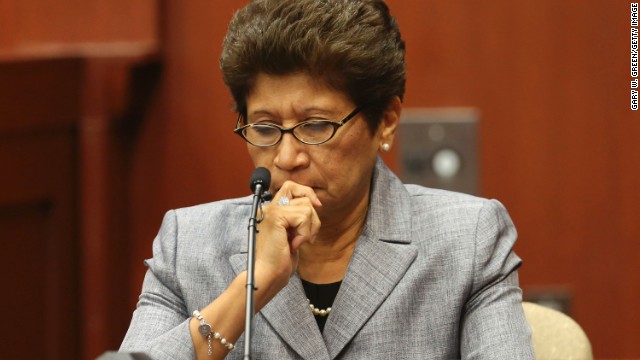 George Zimmerman's mother, Gladys Zimmerman, listens to the 911 tape while taking the stand during his trial in Seminole County circuit court on July 5.
George Zimmerman's mother, Gladys Zimmerman, listens to the 911 tape while taking the stand during his trial in Seminole County circuit court on July 5.  Martin's brother Jahvaris Fulton testifies at the Zimmerman trial in Seminole County circuit court on July 5.
Martin's brother Jahvaris Fulton testifies at the Zimmerman trial in Seminole County circuit court on July 5. 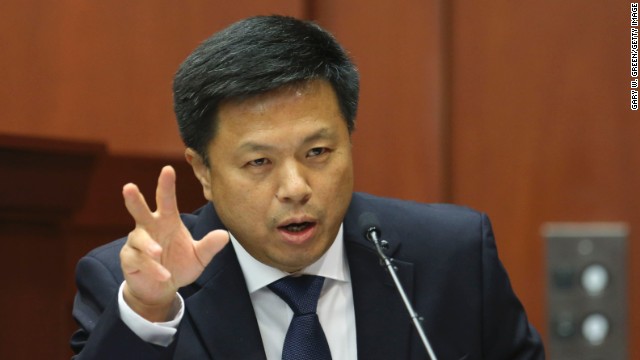 Volusia and Seminole County associate medical examiner Shiping Bao testifies on July 5. Bao conducted the final autopsy on Martin and determined the cause of death to be a gunshot wound to the chest.
Volusia and Seminole County associate medical examiner Shiping Bao testifies on July 5. Bao conducted the final autopsy on Martin and determined the cause of death to be a gunshot wound to the chest.  Florida Department of Law Enforcement Crime Lab Analyst Anthony Gorgone testifies about DNA findings on Wednesday, July 3, in Sanford, Florida. Here, Gorgone points to a sweatshirt worn by Trayvon Martin on the night Martin was shot. Only one stain on Martin's hooded jacket yielded a partial DNA profile that matched Zimmerman's.
Florida Department of Law Enforcement Crime Lab Analyst Anthony Gorgone testifies about DNA findings on Wednesday, July 3, in Sanford, Florida. Here, Gorgone points to a sweatshirt worn by Trayvon Martin on the night Martin was shot. Only one stain on Martin's hooded jacket yielded a partial DNA profile that matched Zimmerman's.  Gorgone points to a jacket worn by Zimmerman on the night of the shooting. Multiple stains on Zimmerman's jacket tested positive for Zimmerman's DNA. At least two stains from the jacket tested positive for a mixture of DNA that included Martin's DNA.
Gorgone points to a jacket worn by Zimmerman on the night of the shooting. Multiple stains on Zimmerman's jacket tested positive for Zimmerman's DNA. At least two stains from the jacket tested positive for a mixture of DNA that included Martin's DNA.  Firearms analyst Amy Siewert from the Florida Department of Law Enforcement answers questions from the prosecution while holding Zimmerman's gun on July 3. Siewert examined the gun and said Zimmerman had one bullet ready to fire in the chamber as well as a fully loaded magazine when the shooting occurred.
Firearms analyst Amy Siewert from the Florida Department of Law Enforcement answers questions from the prosecution while holding Zimmerman's gun on July 3. Siewert examined the gun and said Zimmerman had one bullet ready to fire in the chamber as well as a fully loaded magazine when the shooting occurred.  Alexis Carter, a military prosecutor, testifies during the trial on July 3. Carter taught a criminal litigation class that Zimmerman completed, and testified that the class included extensive coverage of Florida's self-defense laws.
Alexis Carter, a military prosecutor, testifies during the trial on July 3. Carter taught a criminal litigation class that Zimmerman completed, and testified that the class included extensive coverage of Florida's self-defense laws.  Mark Osterman, a U.S. Air Marshal and friend of Zimmerman's who wrote a book about the case, testifies on Tuesday, July 2. He recounted the story of the shooting that Zimmerman told him and testified that when he took Zimmerman home from the police station after the shooting, Zimmerman wasn't acting like himself.
Mark Osterman, a U.S. Air Marshal and friend of Zimmerman's who wrote a book about the case, testifies on Tuesday, July 2. He recounted the story of the shooting that Zimmerman told him and testified that when he took Zimmerman home from the police station after the shooting, Zimmerman wasn't acting like himself.  Prosecutor Bernie de la Rionda, on July 2, demonstrates a possible scenario while questioning state witness Chris Serino, a Sanford police officer.
Prosecutor Bernie de la Rionda, on July 2, demonstrates a possible scenario while questioning state witness Chris Serino, a Sanford police officer.  Hirotaka Nakasone, a voice recognition expert with the FBI, testifies in the Zimmerman trial on Monday, July 1.
Hirotaka Nakasone, a voice recognition expert with the FBI, testifies in the Zimmerman trial on Monday, July 1.  Witness Jonathan Good is cross-examined by defense attorney Mark O'Mara on Friday, June 28.
Witness Jonathan Good is cross-examined by defense attorney Mark O'Mara on Friday, June 28.  Selma Mora reenacts a scenario for defense attorney Mark O'Mara on Thursday, June 27. Mora lived in Zimmerman's neighborhood at the time of the shooting.
Selma Mora reenacts a scenario for defense attorney Mark O'Mara on Thursday, June 27. Mora lived in Zimmerman's neighborhood at the time of the shooting. 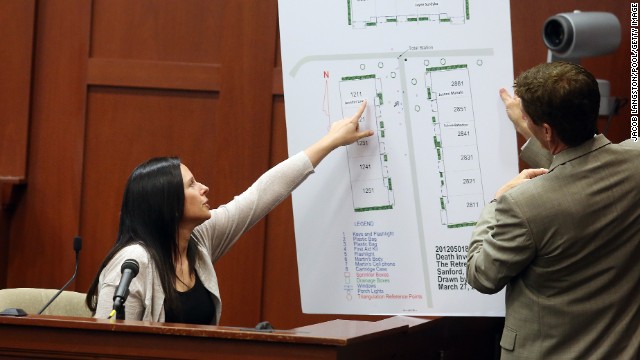 Witness Jennifer Lauer points to where her former home was in the Retreat at Twin Lakes community during questioning by defense attorney Mark O'Mara on June 27. Lauer called 911 on the night of the shooting.
Witness Jennifer Lauer points to where her former home was in the Retreat at Twin Lakes community during questioning by defense attorney Mark O'Mara on June 27. Lauer called 911 on the night of the shooting. 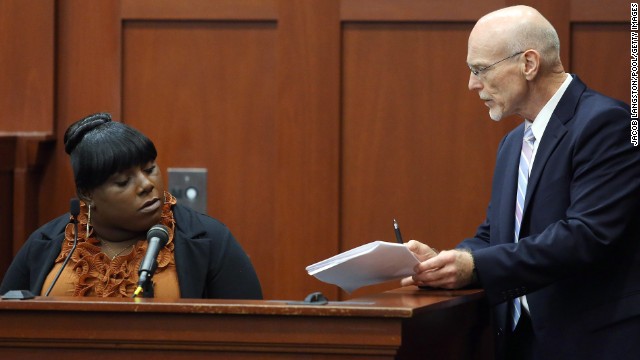 Rachel Jeantel, a friend of Martin's, is questioned by defense attorney Don West on June 27. She appeared to get frustrated several times during the cross-examination, including one time when West suggested they could break until the morning so she'd have more time to review the deposition transcript.
Rachel Jeantel, a friend of Martin's, is questioned by defense attorney Don West on June 27. She appeared to get frustrated several times during the cross-examination, including one time when West suggested they could break until the morning so she'd have more time to review the deposition transcript.  The evidence letter that Jeantel says she wrote with a friend for Sybrina Fulton, Martin's mother, is displayed during the trial on June 27. When the defense asked Jeantel to read the letter, she said she couldn't read cursive. She asked a friend to write the letter for her, she said.
The evidence letter that Jeantel says she wrote with a friend for Sybrina Fulton, Martin's mother, is displayed during the trial on June 27. When the defense asked Jeantel to read the letter, she said she couldn't read cursive. She asked a friend to write the letter for her, she said.  Jeantel testifies on Wednesday, June 26. She was the last person to speak with Martin on the phone.
Jeantel testifies on Wednesday, June 26. She was the last person to speak with Martin on the phone. 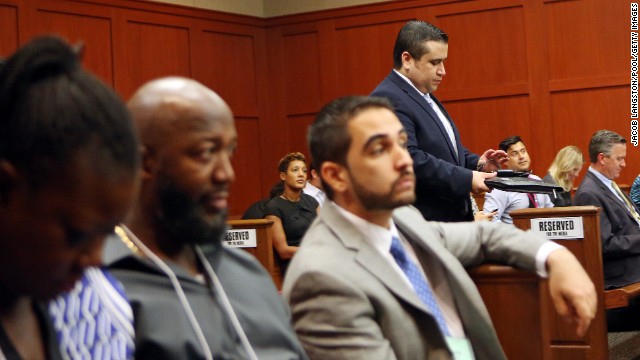 Zimmerman walks past Martin's parents, Sybrina Fulton, left, and Tracy Martin, second from left, as he enters the courtroom after lunch recess on June 26.
Zimmerman walks past Martin's parents, Sybrina Fulton, left, and Tracy Martin, second from left, as he enters the courtroom after lunch recess on June 26.  Diana Smith of the Sanford Police Department on Tuesday, June 25, shows the jury a bag of Skittles that was collected as evidence at the crime scene. Martin was said to be carrying the bag of candy and a soft drink at the time of his death.
Diana Smith of the Sanford Police Department on Tuesday, June 25, shows the jury a bag of Skittles that was collected as evidence at the crime scene. Martin was said to be carrying the bag of candy and a soft drink at the time of his death.  Assistant state attorneys John Guy, left, and Richard Mantei hold up Martin's sweatshirt as evidence during Zimmerman's trial on June 25. After Martin's death, protesters started wearing hoodies in solidarity against racial profiling.
Assistant state attorneys John Guy, left, and Richard Mantei hold up Martin's sweatshirt as evidence during Zimmerman's trial on June 25. After Martin's death, protesters started wearing hoodies in solidarity against racial profiling.  During the trial on June 25, crime scene technician Diana Smith shows the jury a gun that was collected as evidence.
During the trial on June 25, crime scene technician Diana Smith shows the jury a gun that was collected as evidence.  Zimmerman laughs with defense attorney Don West during his trial on June 25.
Zimmerman laughs with defense attorney Don West during his trial on June 25. 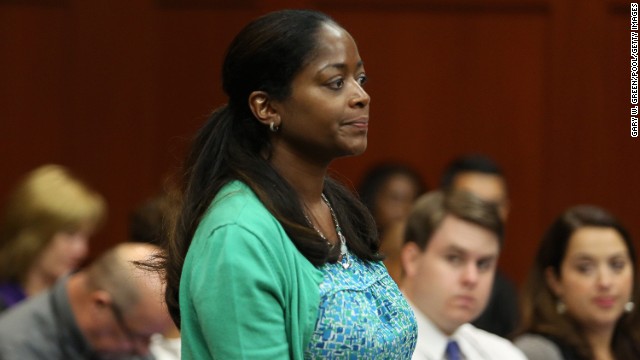 Selene Bahadoor enters the courtroom to take the witness stand on June 25. She was the first eyewitness to testify and said the shooting occured right behind her home.
Selene Bahadoor enters the courtroom to take the witness stand on June 25. She was the first eyewitness to testify and said the shooting occured right behind her home.  Seminole County 911 dispatcher Sean Noffke testifies on Monday, June 24, about his conversation with Zimmerman on a non-emergency line the night of the shooting.
Seminole County 911 dispatcher Sean Noffke testifies on Monday, June 24, about his conversation with Zimmerman on a non-emergency line the night of the shooting. 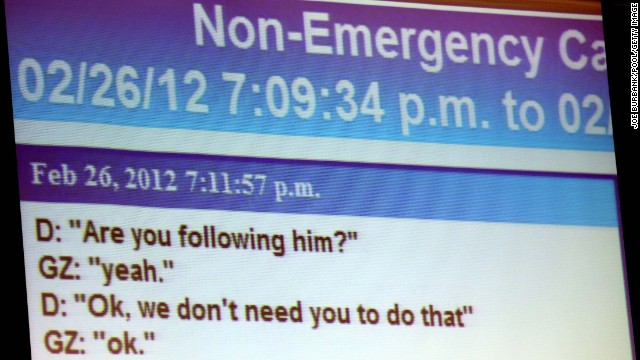 A transcript of Zimmerman's police call on the night of the shooting is projected during opening arguments on June 24.
A transcript of Zimmerman's police call on the night of the shooting is projected during opening arguments on June 24.  Martin's father, Tracy Martin, cries on June 24 as he listens to the description of his son's death.
Martin's father, Tracy Martin, cries on June 24 as he listens to the description of his son's death.  Prosecutor John Guy gestures during his opening arguments on June 24. His first words to the six-woman jury may have raised a few eyebrows. "Good morning. 'F*****g punks, these a******s all get away,'" Guy quoted Zimmerman. "These were the words in this grown man's mouth as he followed this boy that he didn't know. Those were his words, not mine."
Prosecutor John Guy gestures during his opening arguments on June 24. His first words to the six-woman jury may have raised a few eyebrows. "Good morning. 'F*****g punks, these a******s all get away,'" Guy quoted Zimmerman. "These were the words in this grown man's mouth as he followed this boy that he didn't know. Those were his words, not mine."  From left, Zimmerman's father, Robert Zimmerman Sr.; his mother, Gladys; and his wife, Shellie, are escorted from the courtroom on June 24. Since they are all on the witness list, the judge ruled they cannot be present in the courtroom until after they testify.
From left, Zimmerman's father, Robert Zimmerman Sr.; his mother, Gladys; and his wife, Shellie, are escorted from the courtroom on June 24. Since they are all on the witness list, the judge ruled they cannot be present in the courtroom until after they testify.  Defense attorney Don West displays a photo of Zimmerman from the night of the shooting during his opening arguments on June 24. He opened his statements with a knock-knock joke but failed to win a laugh. "Knock knock. Who's there? George Zimmerman. George Zimmerman who? Good, you're on the jury," he said.
Defense attorney Don West displays a photo of Zimmerman from the night of the shooting during his opening arguments on June 24. He opened his statements with a knock-knock joke but failed to win a laugh. "Knock knock. Who's there? George Zimmerman. George Zimmerman who? Good, you're on the jury," he said. 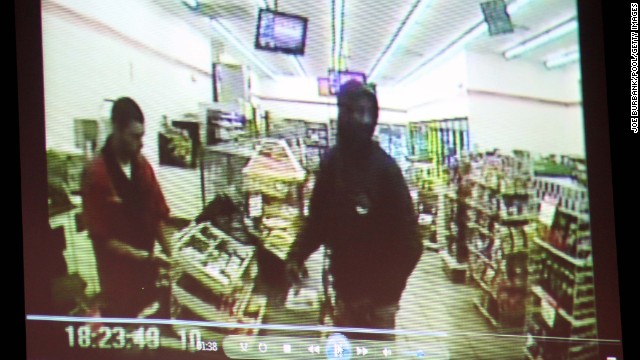 A video entered as evidence is displayed on June 24. It shows Martin, right, at a 7-Eleven on the night of his shooting.
A video entered as evidence is displayed on June 24. It shows Martin, right, at a 7-Eleven on the night of his shooting.  From left, Martin's parents, Tracy Martin and Sybrina Fulton, and Benjamin Crump, the family's legal counsel, make a brief statement to the media before jurors heard opening statements on June 24.
From left, Martin's parents, Tracy Martin and Sybrina Fulton, and Benjamin Crump, the family's legal counsel, make a brief statement to the media before jurors heard opening statements on June 24.  Zimmerman waits for the start of his trial on June 24.
Zimmerman waits for the start of his trial on June 24. Key moments in the Zimmerman trial
Key moments in the Zimmerman trial
Key moments in the Zimmerman trial
Key moments in the Zimmerman trial
Key moments in the Zimmerman trial
Key moments in the Zimmerman trial
Key moments in the Zimmerman trial
Key moments in the Zimmerman trial
Key moments in the Zimmerman trial
Key moments in the Zimmerman trial
Key moments in the Zimmerman trial
Key moments in the Zimmerman trial
Key moments in the Zimmerman trial
Key moments in the Zimmerman trial
Key moments in the Zimmerman trial
Key moments in the Zimmerman trial
Key moments in the Zimmerman trial
Key moments in the Zimmerman trial
Key moments in the Zimmerman trial
Key moments in the Zimmerman trial
Key moments in the Zimmerman trial
Key moments in the Zimmerman trial
Key moments in the Zimmerman trial
Key moments in the Zimmerman trial
Key moments in the Zimmerman trial
Key moments in the Zimmerman trial
Key moments in the Zimmerman trial
Key moments in the Zimmerman trial
Key moments in the Zimmerman trial
Key moments in the Zimmerman trial
Key moments in the Zimmerman trial
Key moments in the Zimmerman trial
Key moments in the Zimmerman trial
Key moments in the Zimmerman trial
Key moments in the Zimmerman trial
Key moments in the Zimmerman trial
Key moments in the Zimmerman trial
Key moments in the Zimmerman trial
Key moments in the Zimmerman trial
Key moments in the Zimmerman trial
Key moments in the Zimmerman trial
Key moments in the Zimmerman trial
Key moments in the Zimmerman trial
Key moments in the Zimmerman trial
Key moments in the Zimmerman trial
Key moments in the Zimmerman trial
Key moments in the Zimmerman trial
 Photos: Zimmerman trial
Photos: Zimmerman trial  Does Zimmerman regret what happened?
Does Zimmerman regret what happened?  Zimmerman: I was a 'scapegoat'
Zimmerman: I was a 'scapegoat'  Zimmerman's life after the trial
Zimmerman's life after the trial "I was hoping for that," he told Chris Cuomo.
But nearly two years after the night when Zimmerman killed 17-year-old Martin in a Florida subdivision, life is anything but the way it used to be for the 30-year-old former neighborhood watchman.
His run-ins with law enforcement since the trial's July conclusion have kept his name in the headlines. He's recently drawn renewed criticism for using his notoriety to hawk his own artwork.
And now, the man who once aspired to become a police officer tells CNN he's hoping to go back to school and pursue a career as a lawyer "to stop the miscarriage of justice."
"I'd like to professionally ... continue my education and hopefully become an attorney," he said. "I think that's the best way to stop the miscarriage of justice that happened to me from happening to somebody else. I don't think it should ever happen to anyone ever again, not one person."
Zimmerman maintains that he acted in self-defense within the law when he shot Martin.
And he says he was a scapegoat for "the government, the President, the attorney general."
Talking about Trayvon with your kids
'I'm sorry for their loss'
Among the misconceptions Zimmerman says still linger about the case: that he's never apologized to Martin's family.
He said he still thinks about everybody involved: about Martin's family, and his own. He said he regrets going out that night, but -- citing a pending U.S. Department of Justice civil rights investigation -- says he can't answer whether he regrets killing Martin.
He said he'd like to reach out to Martin's family and apologize, like he did during his 2012 bond hearing.
"I would say exactly what I said on the stand," he said, "that I'm sorry for their loss."
At the time, attorneys for Martin's family called the courtroom apology a self-serving act by a man facing a life prison sentence.
Now, Zimmerman's no longer facing prison time -- but a string of run-ins with the law since his release have repeatedly sent him back into the spotlight.
It started with a speeding ticket. Next, Zimmerman's wife called 911, saying he was threatening her and her father with a gun. There were no charges, but Zimmerman's wife later filed for divorce. Then, Zimmerman's girlfriend accused him of chasing her with a shotgun. This time, Zimmerman called 911, to get his side of the story out.
His girlfriend later said she wanted charges dropped and lifted a restraining order against him.
 Promoter defends Zimmerman, DMX boxing
Promoter defends Zimmerman, DMX boxing  2013: Zimmerman found not guilty
2013: Zimmerman found not guilty Boxing match backlash
Just when Zimmerman's name had faded from the headlines, it came up again this month with reports that he'd be participating in a boxing bout with rapper DMX. After backlash surged, the promoter canceled the fight. Zimmerman says the whole thing was a misunderstanding -- and that there were never any racial overtones when he signed on to do the event for charity.
"It was going to be an unknown person and be a smaller event," he said.
"If I went out there and got beat up, the charity was still getting paid," he said. "I don't want to get beat up, but I saw it as an opportunity. I never expected it to be, to turn out the way it did."
Even though his name since the trial has repeatedly made the news, don't expect Zimmerman to comment on current events.
Asked by Cuomo to weigh in on the case of Michael Dunn, a Florida man who killed an African-American teen after a dispute over loud music, he said he didn't know enough details.
"I don't watch news anymore," he said. "I watch comedy shows, home improvement shows. So I'm not well enough informed to give you exacts."
A new hobby
During his interview with CNN, Zimmerman's girlfriend and her young daughter wouldn't leave his side.
Neither, it seems, will controversy -- thanks, in part, to his new hobby: painting art, and selling it.
Zimmerman admits he's pushed to get publicity for his artwork. And it's worked. His first painting sold for more than $100,000 on eBay.
"To be honest, I was hoping to be able to provide a decent lifestyle for my family," he said.
In an interview that aired on the Spanish-language Univision network Sunday, Zimmerman said he was unemployed, had a personal debt of $2.5 million and wasn't receiving any government benefits.
But aside from the possible financial boost, Zimmerman said one painting -- a portrait depicting Special Prosecutor Angela Corey and slamming the U.S. judicial system -- had a deeper purpose.
"It was a creative, tangible forum to show my inner thoughts, my inner feelings. ... It provided a tremendous release for me," he said.
'They don't know me'
Zimmerman says he still gets death threats.
"I have a lot of people saying that, you know, they guarantee that they're going to kill me and I'll never be a free man," he said. "I realize that they don't know me. They know who I was portrayed to be."
People who accuse him of being racist, he said, don't understand that he was raised by Peruvian family members and that some members of his family are black.
"Before the trial, during and after, I've learned that the majority of people, when they sit down with me one-on-one or with my family, they get a completely different perspective on me," he said.
But that doesn't change the anger that many people feel about his case, Cuomo told Zimmerman.
"This case became a metaphor, an example. Your face became the face of, 'This is the guy who gets away with killing a black kid,' " Cuomo said. "What do you do with that?"
Zimmerman says he'll keep fighting that accusation, for as long as it takes.
"If it takes one person a day at a time to help them realize that's not what this case was about," he said, "then that's what I'll do."
Watch New Day weekdays at 6am-9am ET. For the latest on New Day click here
No comments:
Post a Comment